This easy recipe for Honey and Onion Cough Syrup is a old folk remedy for cough and colds. It combines the well known benefits of onion and honey to create a simple, affordable homemade cough syrup to help sooth a sore throat and clear excess mucus.
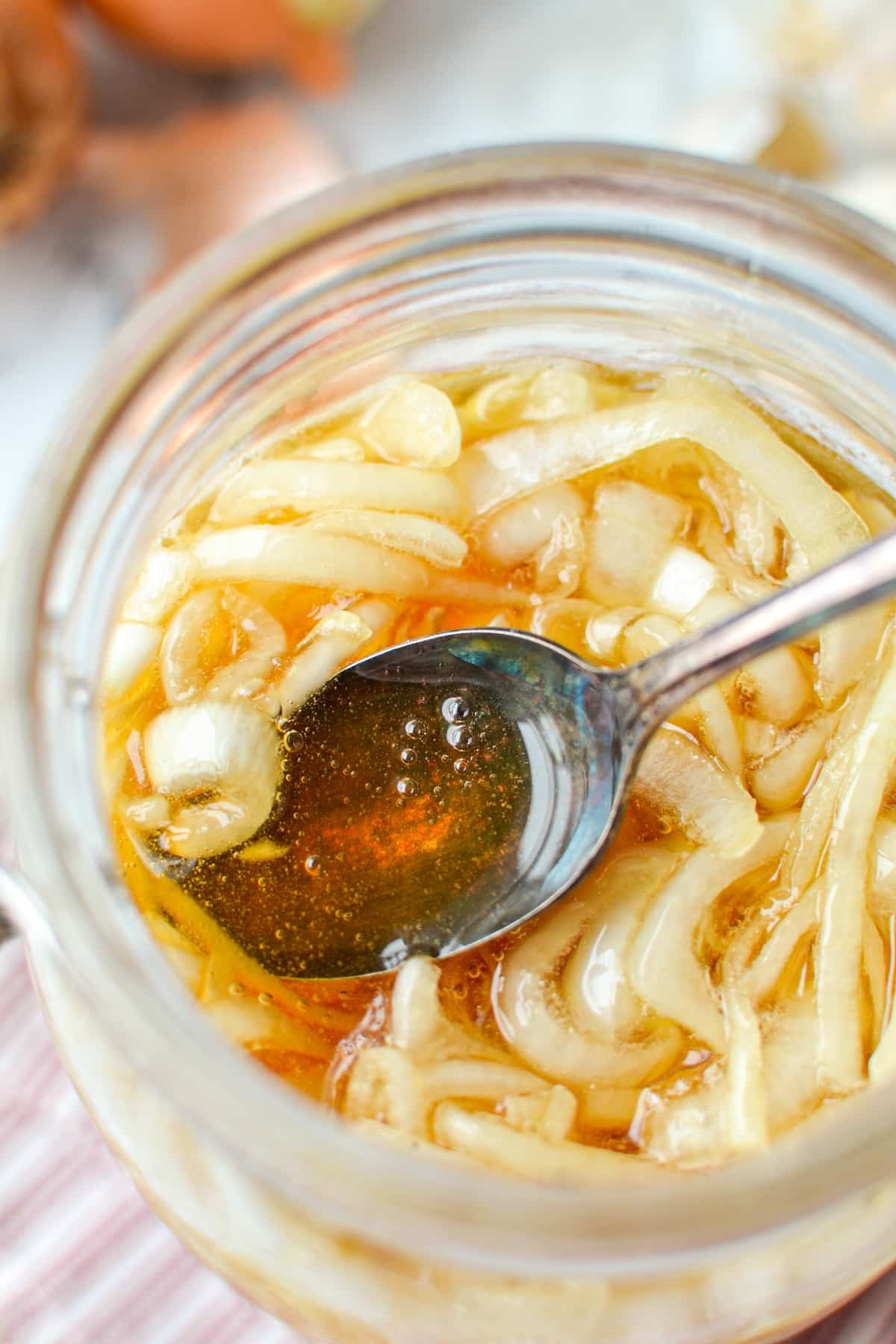
This simple, timeless recipe for Honey and Onion Cough Syrup was first introduced to me in the book Medicinal Herbs by Rosemary Gladstar. It's a folk medicine recipe that has been passed down throughout the generations, and a quick look online shows you that something similar has been made for countless generations in cultures all over the globe.
While many traditional recipes call for steeping the raw onions in with the honey for several days, Rosemary's is different in that she warms the honey ever so slightly, allowing the onions to soften and release their beneficial sulfur compounds.
I add a little garlic to my version (although it's optional), as well as give you more structured ingredient amounts and recipe times so it's easy to create in your own kitchen.
Reasons to Love This Recipe:
- It's made with simple, household ingredients that have great healing properties.
- Easy enough for a beginner to make.
- Tastes surprisingly good, making it a bit easier to give to sick kids.
- A powerful folk remedy that has been used for generations and generations.
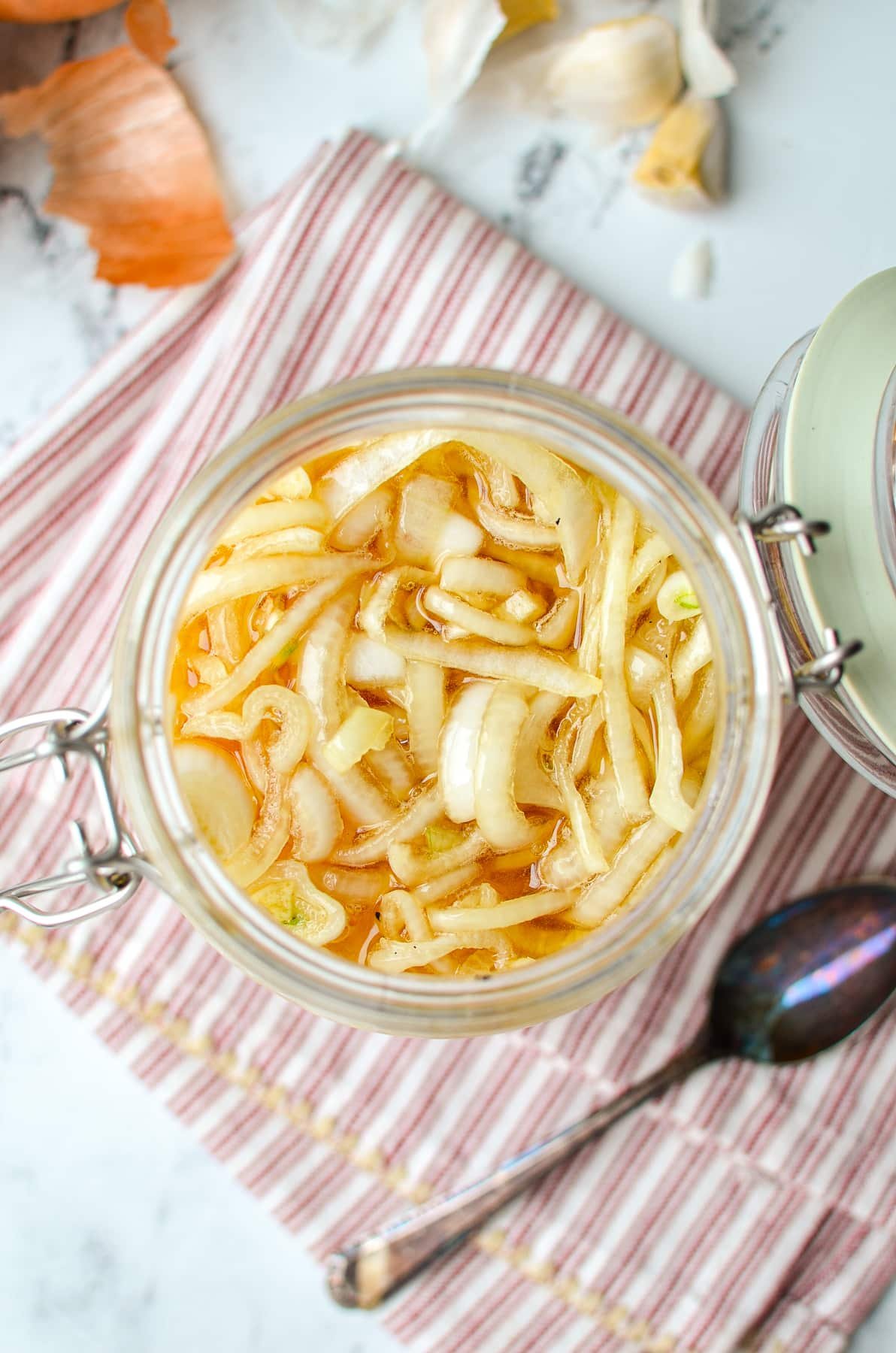
Honey and Onion Cough Syrup Benefits
Both honey and onions have been used for millennia to cure common ailments such as cough, cold, and respiratory issues. The use of these two household ingredients in folk remedies is almost as old as time itself, and the combination is still used to this day.
Since honey and onion cough syrup contains both honey and onion, it combines the benefits of each of these into one (surprisingly) delicious syrup that is easy to make.
Here are just a few benefits:
- Honey is antibacterial, anti-inflammatory, and a powerful antioxidant.
- Honey soothes a sore and tired throat.
- Onion contains the antioxidant quercetin, which fights inflammation in the body.
- Onion is high in sulfur compounds (as is garlic), which has been shown to help with a variety of health issues.
- Since onion is an expectorant it helps clear mucus, which is common with a cough.
- Onions have electrolytes, which is essential for keeping hydrated during an illness.
Ingredients
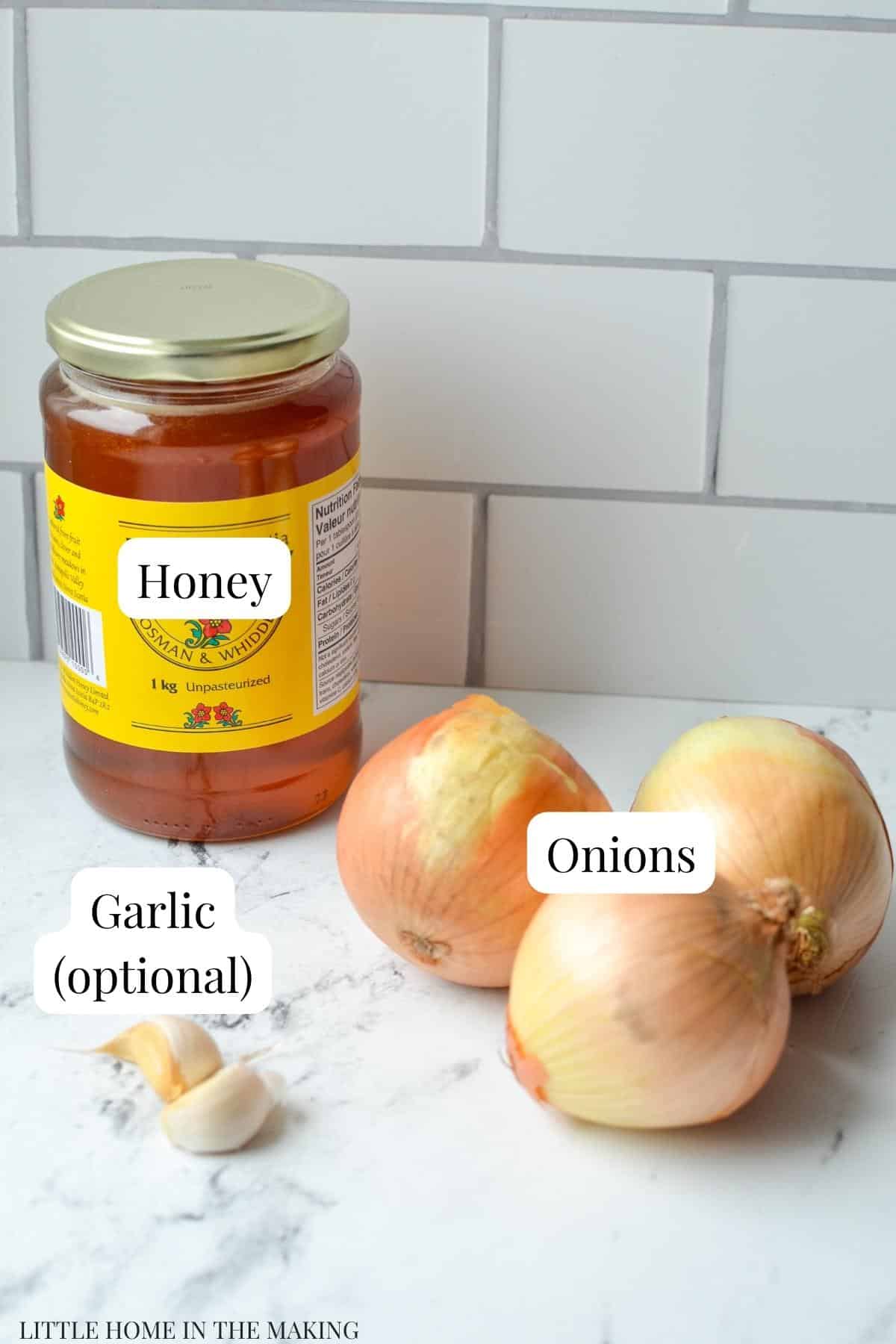
- Onions: You will need 2-3 onions. If you don't grow your own, I recommend seeking out an organic option. Since it's a medicinal recipe it's a good idea to invest in the best quality.
- Honey: Seek out raw/unpasteurized honey. You'll get all of the beneficial enzymes, as well as the antibacterial, antioxidant, and anti-inflammatory effects of honey.
- Garlic (optional): This is an optional ingredient, but garlic is well established in herbal medicine. Use organic or local garlic if available.
IMPORTANT NOTE: Honey is not safe for babies under the age of 1 year to consume. You could try a preparation made with maple syrup or glycerine instead, but be sure to consult with your health care provider first.
How to Make Cough Syrup with Onion and Honey
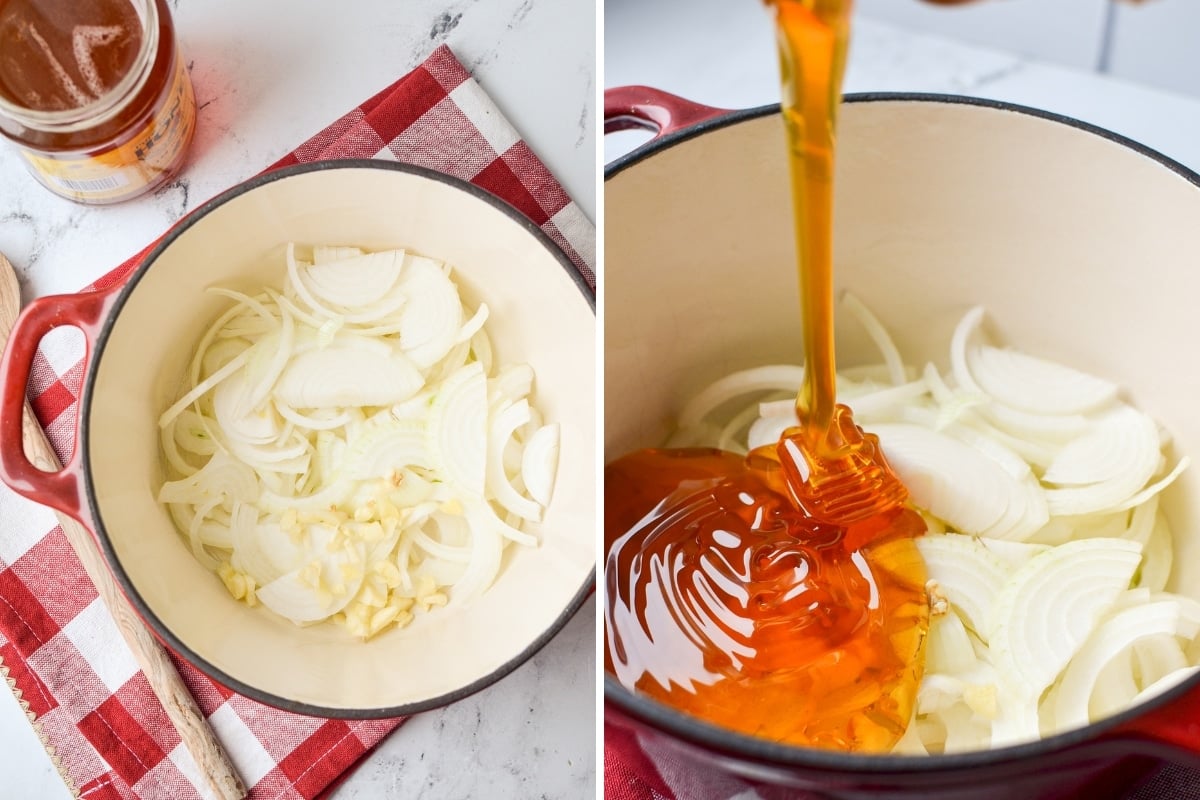
- To get started, simply peel and cut your onions in half. Then slice them into thin half-moon shapes. Add them to a medium sized pot, then add in some chopped garlic (2-3 cloves) if desired.
- Add in the honey, drizzling in enough to completely cover the onions. They do not need to be submerged under an inch or more of honey, just enough that all of the onions are coated and covered.
Warming the Honey and Onions
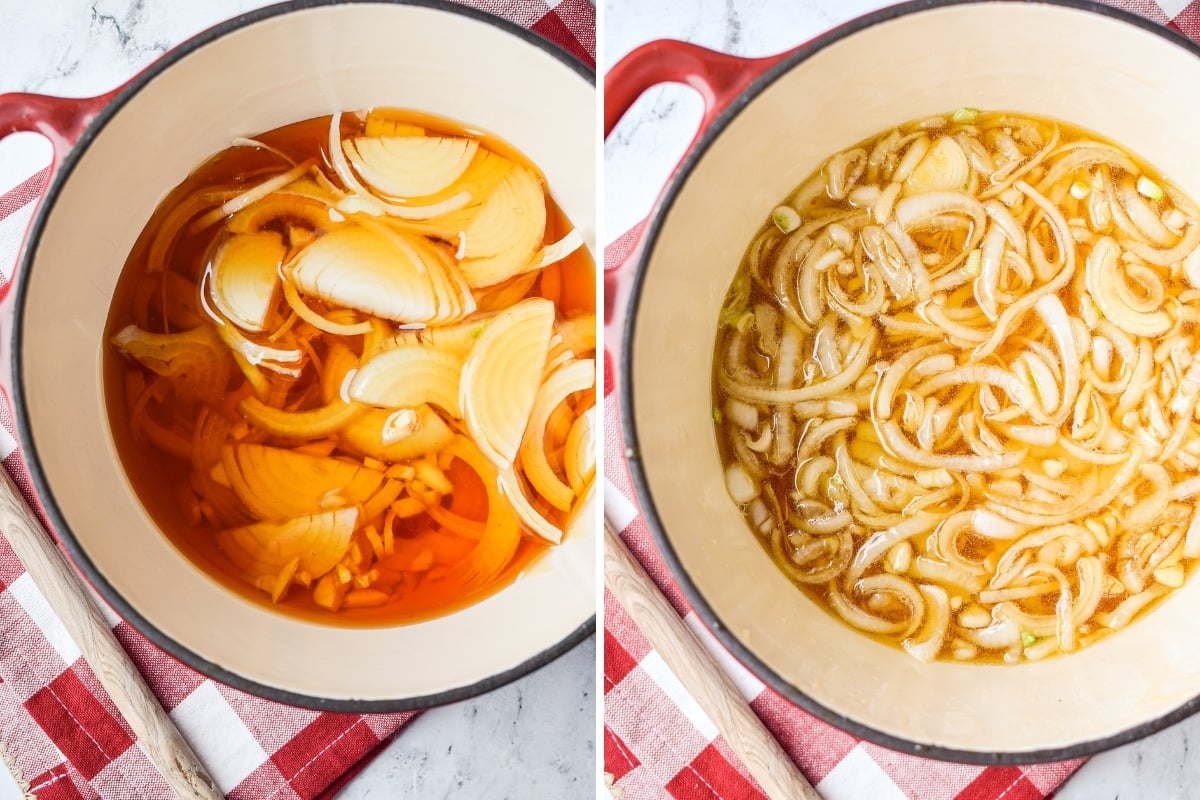
- Place your pot on the stove, and heat over low heat until the onions are very soft and slightly mushy. Stir occasionally to encourage even heating - the mixture should never feel hot to the touch, just warm.
- It will take around 1-2 hours for your onions to soften, and you may need to increase the heat ever so slightly if the onions are not losing their shape within the first 30 minutes or so.
- Once the onions are soft and slightly mushy, taste your syrup to check the flavor. It should taste pleasantly of honey with just a touch of onion - it's surprisingly tasty!
- Allow it to cool to room temperature completely before transferring to a jar for storage - this prevents condensation and moisture in the jar.
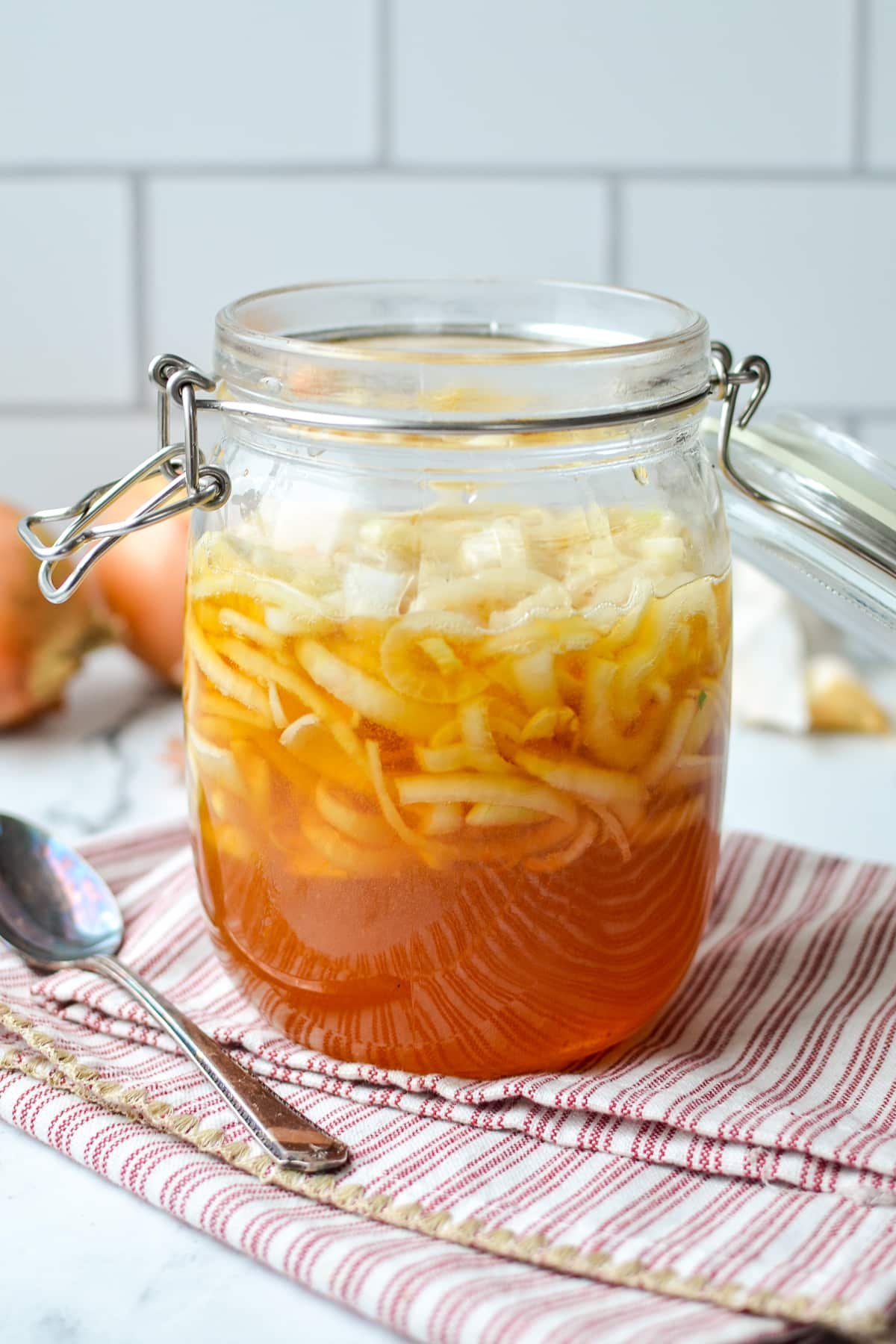
Dosing Recommendations
At the onset of symptoms: Take ½-1 teaspoon (2.5 - 5 milliliters) every 1-2 hours.
Treating an active cough: 1 teaspoon (5 milliliters) 3-4 times per day until you have recovered.
Storing and Shelf Life
- Once your honey onion cough syrup has cooled to room temperature, transfer it to a clean jar with a lid. This can be a swing-top jar or a wide mouth mason jar with a plastic lid. Just make sure it's nice and clean to ensure the longest storage possible of your homemade cough syrup.
- If you leave the onions in the syrup you can expect for this to store in the fridge for up to 1 week.
- If you want it to store for 2-6 months, just carefully remove the onions using a clean utensil. Then transfer to the fridge and watch carefully for signs of spoilage such as an off smell, color, or mold growth. Discard if there are any signs of spoilage.
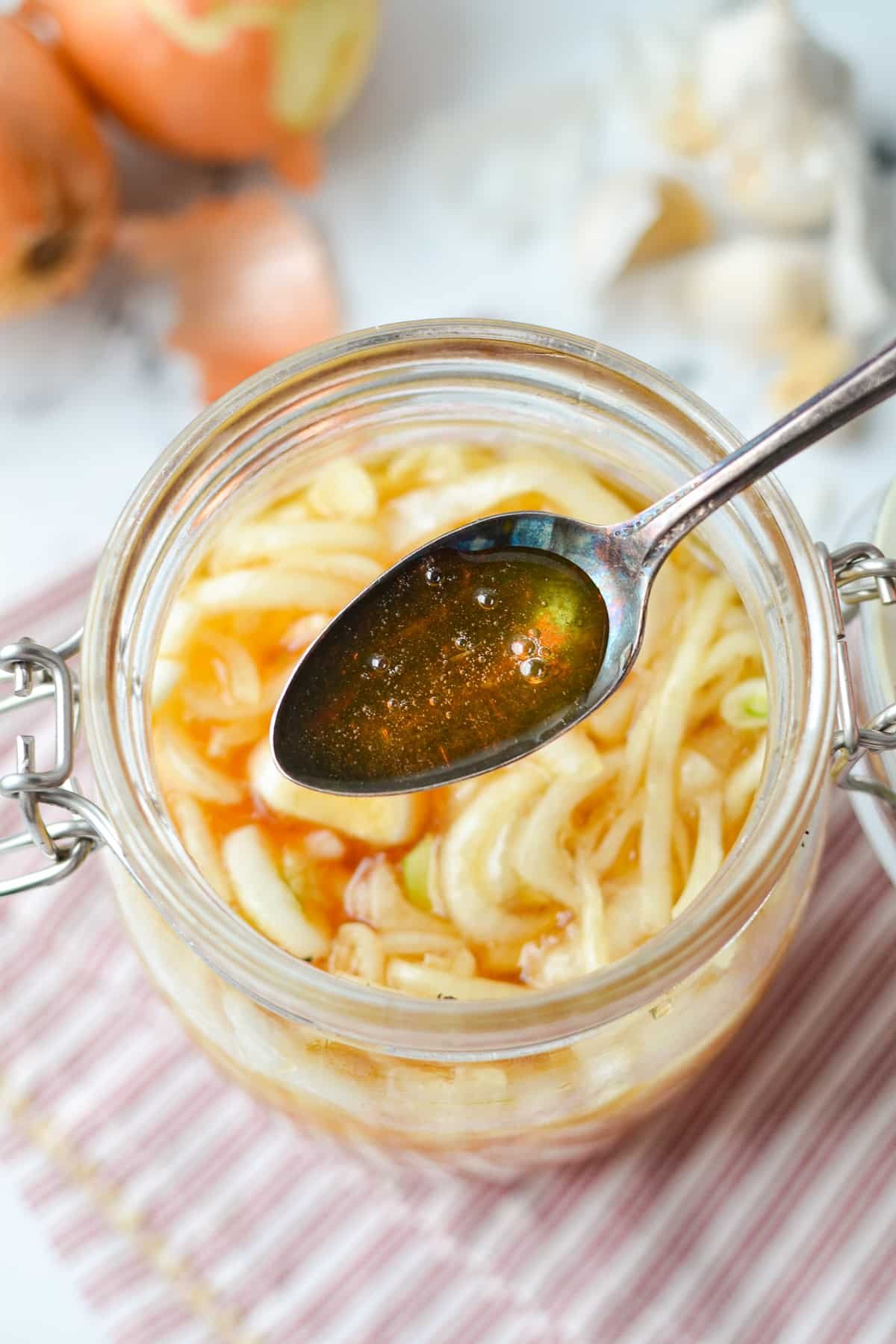
Variations and Substitutions
With lemon: When making honey syrups I like to avoid adding liquid when possible, as this can shorten the shelf life. If you want to add lemon to your honey onion syrup, I’d recommend setting aside 2-3 days worth and adding fresh lemon juice to taste to the small amount. This will help prolong the storage of your main batch.
With ginger: Add 2-3 teaspoons of freshly grated ginger in with the garlic and onions. Ginger has been shown to reduce nausea, and is also anti-inflammatory.
Without honey: If you have babies under 1 year at home (but older than 6 months), you may be wondering if there is a way you can make honey and onion cough syrup without honey. I haven't tried it myself, but popular substitutes for honey in herbal remedies include maple syrup, glycerin, and brown sugar. Be sure to check with your healthcare provider before giving it to children.
Note that if you use maple syrup or glycerine, your storage time is reduced as well. I would recommend 2-3 days with the onions in the syrup, and up to 2 weeks without the onions as a starting place. Discard if there are any signs of spoilage such as an off color, presence of mold or growth, or an off smell.
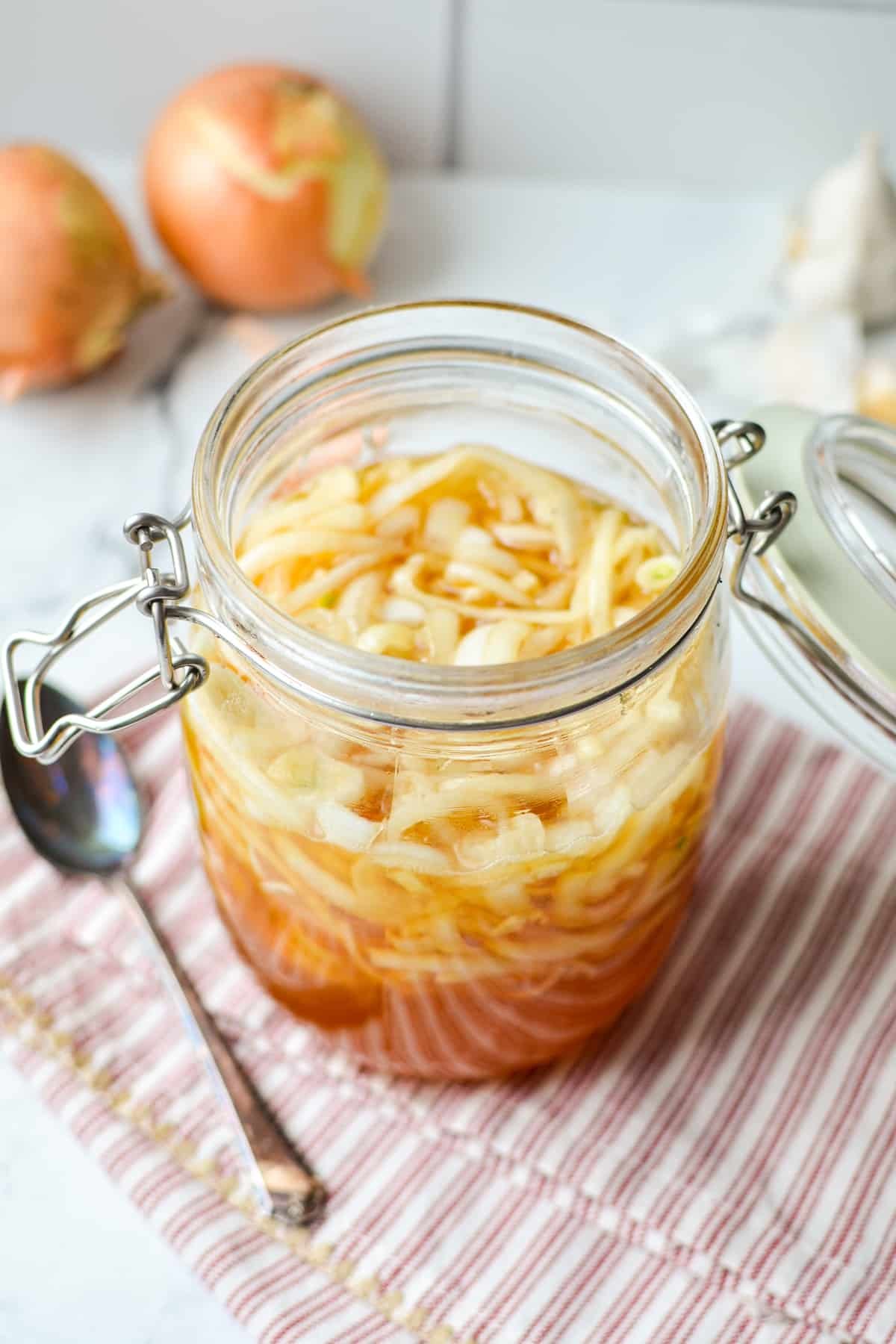
Frequently Asked Questions
Many traditional recipes call for allowing the honey and onion to rest at room temperature for 1-2 days. Because onions are a low acid food, and honey has a risk for botulism, experienced food preservers would recommend warming the honey gently with the onions, and then storing the resulting syrup in the refrigerator.
Honey and onion cough syrup can be stored in the refrigerator for up to 1 week if the onions are left in the syrup. If you strain the onions, you can expect a storage time of anywhere from 2-6 months. Be sure to discard if there are any signs of spoilage such as an off smell or color, or any growth or mold.
Honey and onion have been used together for centuries to help with cough and cold. Onions have been used in folk medicine for many years to help with respiratory issues, and is still used today to treat mild coughs. Honey contains many beneficial enzymes and helps to boost immune health, as it is a powerful antioxidant. It is also anti-inflammatory and antibacterial, making it the perfect base for a homemade cough syrup.
Onion is an expectorant, meaning it helps to clear mucus. Expectorants lubricate your airways and help make a cough productive. A productive cough brings up excess mucus, allowing it to be cleared from the body. This helps you to recover more quickly from a cold, and prevent it from becoming worse.
More Natural Remedies
If you loved this honey onion syrup recipe, let me know by leaving a 5-star review in the recipe card or comment below! You can also tag me on Instagram @littlehomeinthemaking.
📖 Recipe
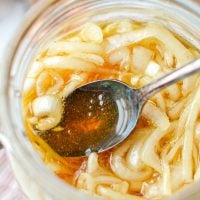
Honey and Onion Cough Syrup
Ingredients
- 2-3 medium onions peeled and sliced into half-moons
- 2 cloves garlic roughly chopped (optional)
- 2-3 cups raw honey
Instructions
- Add the sliced onions to a medium heavy-bottomed saucepan or dutch oven, along with the chopped garlic (if using).
- Add enough honey to cover the onions. They do not need to be entirely submerged, but the honey level should be as high as the onions.
- Turn the burner on low and allow the onions and garlic to soften, stirring occasionally.
- Cook on low heat until the onions are soft and slightly mushy, about 1-2 hours. Stir occasionally to encourage even heating.
- If your onions are still not very soft, you can increase the heat slightly to encourage them to release their juices. The goal is to keep the heat low to preserve the enzymes and benefits of honey.
- Once the honey has been infused, turn off the heat and allow it to cool to room temperature.
- Place the honey onion cough syrup in a glass jar, and top it with a lid once the honey is no longer warm.
- Store in the refrigerator for up to 1 week with the onions and garlic, or strain off the onions and garlic if you would like to store for 2-6 months. Discard if there are any signs of spoilage such as mold or an off smell.
- Take ½ - 1 teaspoon every 1-2 hours at the first signs of a cold. If you’re treating a cold that has already started, take 1 teaspoon 3-4 times per day.
Notes
Nutrition
Please note that some of my blog posts here at Little Home in the Making may contain affiliate links. If you make a purchase through these links, I will get a small commission at no additional cost to you. See our disclaimer for more information.

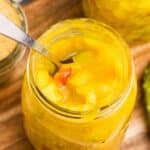



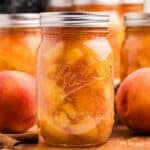








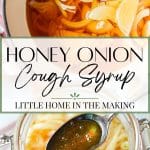

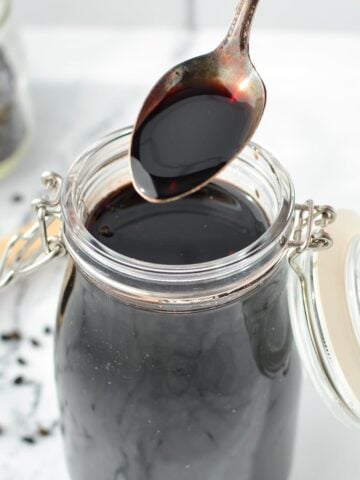
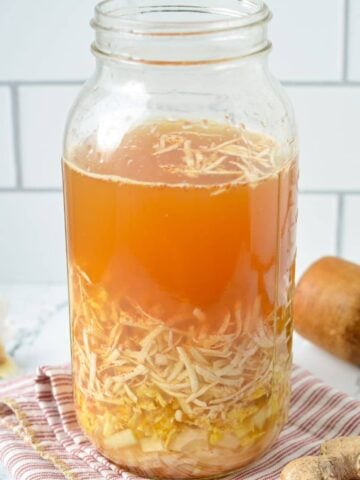
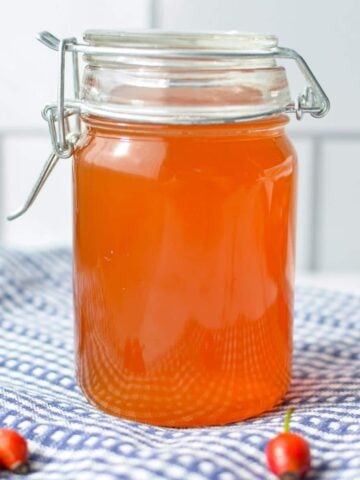

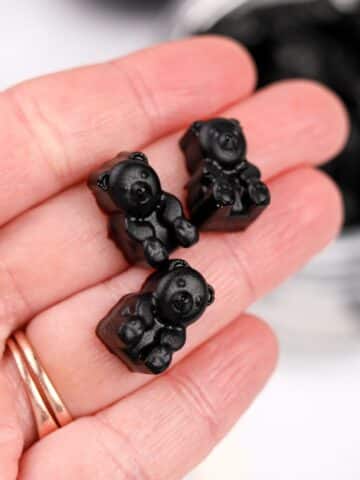
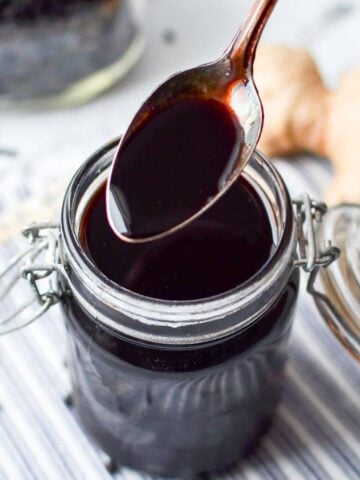
VINCENT Britton
seems like a sous vide would be very beneficial in this recipe.. any idea as to what tp would be optimal?
Dolly | Little Home in the Making
I haven't made it with a sous vide, but you generally want to keep it very low to avoid overheating the honey. Something under 90F is ideal.
sarah
I've heated mine au-bain-marie in the slowcooker. added all the ingredients in a jar, just put the lid on top (not closed) to avoid condensation getting in and heated it for a few hours. I also added fresh thyme + ginger + cinnamon. It's not yummy, but it's not bad.. I just want this cold to be over with...
Dolly | Little Home in the Making
That sounds like a really lovely way to make it! I'll have to try it.
I hope you're feeling better now!
A
Can you freeze onion syrup? if so for how long?
Dolly | Little Home in the Making
I have not tried freezing the syrup or honey itself actually! But a quick search tells me that honey is okay to freeze, but it isn't super ideal. Once the onions have been strained the infused honey can be kept in the fridge for a good long while, so that may be a good option for you.
Kat
Can you use any kind of onion?
Dolly | Little Home in the Making
Any type of bulb onion like yellow, spanish, red, etc.
Ashley
Thank you for sharing this. I am excited to make this today as I woke up with a bit of a soar throat. I think I will try warming this in the crockpot. I am going to put the honey and onion in a mason jar and put it on a towel in the crockpot with water half way up the jar. hoping it works this way so I don't have to monitor the stove. Do you think this would work ok?
Dolly | Little Home in the Making
I definitely think that would work!
Michael
How much are you heating the mixture. Seems to be counterproductive to use raw honey only to heat it.
Dolly | Little Home in the Making
The heat is very low, and with my temperature checks it was between 80-90F, which preserves many of the benefits of raw honey. Regular honey can be used too, or you can infuse the raw honey and onions at room temperature for 24-48 hours.
Betsy
I don't heat mine I just put the onions then honey put lid on it
Tina
I do the same
William
How long is this good for? How long can I store it?
Dolly | Little Home in the Making
If you leave the onions in the syrup you have about 1 week, or 2-6 months if the onions are removed.
Lauren
I made this today for my daughter, I used the simmer burner on my stove, on the lowest possible heat, but my onions did get hot. There was no boiling or anything, but hot to touch. Have I ruined it? I
Dolly | Little Home in the Making
It's probably totally fine! Some stovetops seem to run a little warmer than others, and cookware plays a role too. Heavy-bottomed saucepans conduct heat better, but thinner saucepans may cause things to get a bit too hot. If there was no boiling, you're probably totally fine!
Angela Lombaard
hi made this today but it boiled for about 4 minutes. does this mean i should not take it?
Dolly | Little Home in the Making
Should be fine to have, but you won't have the added benefits of raw (or low temp pasteurized) honey. There are still lots of benefits though!
Blanche
I am not sure if you eat the onion or just allow them to be in the honey to naturally provide what healing they offer, or do you eat the onion and honey.
Dolly | Little Home in the Making
If serving to children I wouldn't ask them to eat the onions - that's a hard ask for them! The process pulls the properties of onions into the honey, so that's good enough in my view. I generally discard the onions because I prepare a batch for the upcoming cold season, but if you want to eat the onions I think that would be totally fine.
Jennifer
Mine was on the lowest setting, and it still produced some bubbles. My onions turned clear in less than 30 minutes. Is mine ok?
Dolly | Little Home in the Making
Oh yes, totally fine! The benefits of raw honey are in place until about 98ºF, and there are still some benefits if heated higher than that. Sometimes using a heavy-bottomed pan helps conduct the heat better and prevents it from getting too hot.
Pat B
are we to also eat the onions?
Dolly | Little Home in the Making
You can if you want to! I generally strain the onions for longer storage time.
Caty P
The only thing about heating the honey is that by doing it that way you kill the live active enzymes. It kind of defeats the purpose of using raw vs pasteurized honey. Let it sit overnight and that should be enough to soften the onions and garlic. You can also chop the onions more finely. More surface area means more oils/compounds are released.
Dolly | Little Home in the Making
Yes, many traditional recipes call for keeping the onions in the honey at room temperature. My preference is to heat it at a super low heat, which keeps many of the enzymes, but reduces the amount of time that the honey stays in the range where bacteria can grow. Different people have different comfort levels, and of course do things differently! This is the same method used by the herbalist Rosemary Gladstar, but many people leave the onions and honey at room temperature.
Betty
I was told that it is not good to store in the refrigerator. I chopped onions and placed the honey together in a glass jar . I left the jar on the counter overnight and each morning have a tsp.
Really, is it important to place the mixture in the fridge?
A doctor told my friend to try the honey and onion BUT nothing about storing in the fridge.
Dolly | Little Home in the Making
A lot of people do things differently, and I've heard that some people store it at room temperature, but that would absolutely not be my choice. That's because of the risk of botulism when low acid foods are stored at room temperature. Even when making controlled fermented mixtures, pH should be checked in order to reduce the risk.
Stephanie
Definitely need to make this to have on hand for winter.
Suzanne
This looks so good! What a great natural remedy to have on hand!
Vanessa
Thanks for sharing! Does it keep long?
George Lavallee
I have been taking this beginning in the 1940s we had a kitchen wood stove with shelves, my mother would make it with onions and sugar in a deep soup bowl, and leave it on the shelve of the stove, I do the same place the bowl on a metal can near my stove.
Dolly | Little Home in the Making
Yes! I've heard many stories of something similar being done with various infusions. The heat from wood stove is like a very low, very constant heat.
Nancy
**if you don’t grow your own onions *** lol do you know the percentage of people in America that actually can “grow” their own onions??? 😂 okkkkk Mrs Martha
Dolly | Little Home in the Making
I'm not under the impression that many people grow their own onions, it's just a simple statement since some of my readers do.
Karyn
Tried this. It worked like magic! Thank you! Once I strained the onions, it was quite delicious.
Karyn Geffriaud
This works way better and quicker than any store bought syrup I’ve ever tried. I think it tastes delicious. I also found the onions are yummy to eat as well.
I kept it in a dark cabinet and after a week or so it was definitely rotting. I’m going to try keeping it in the refrigerator after it’s done this time, but really it lasted until we didn’t need it any more. Thank you so much for sharing this!!
Dolly | Little Home in the Making
Hi Karyn! So glad you liked it! The refrigerator should help a lot when you do your next batch. I store mine without onions for 3-6 months in the refrigerator.
Ray
Great recipe for alternative and healthy medicine.